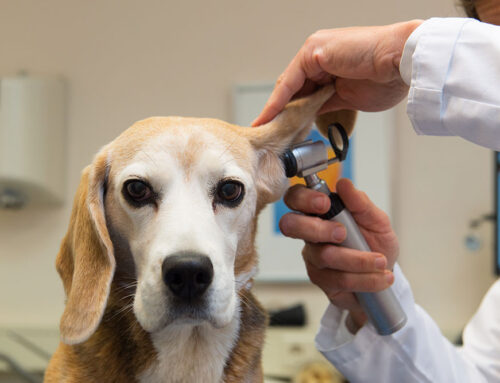The prostate is a small gland located near the urinary bladder of male dogs and produces some of the fluids found in semen necessary during breeding. It surrounds the urethra which carries urine from the bladder to the outside world and lays beneath the colon. This is why prostatic disease will often result in problems with urination and/or defecation.
Enlargement of the prostate gland is common with most prostatic diseases. It is very rare for a male dog to have prostate problems, if they are neutered at a young age. It is not uncommon for unneutered males to have prostate problems when they get older. The enlarged prostate puts pressure on the urethra and urination becomes difficult and uncomfortable and you may begin to see blood in the urine. An affected dog will spend a long time trying to urinate and the urine may only come out in a thin stream or multiple spurts. Other problems such as bladder stones may also cause these symptoms. Also, with inflammation of the prostate, your pet may tuck his rear legs under him and be painful in the caudal abdomen. If prostatic disease becomes more advanced, the colon will also be compressed, causing difficulty in passing feces. If your male dog strains to urinate or defecate, have him examined by your veterinarian.
There are many diseases that affect the prostate and range from the benign enlargement, called hyperplasia, caused by excess testosterone to potentially life-threatening prostate cancer. The prostate can also form cysts or abscesses and can become infected by bacteria traveling up the urethra. All of these diseases can present exactly the same and we may need an array of tests to determine the cause. The first step is to determine if the gland is enlarged by palpating the prostate through the abdominal wall or through the rectal wall. Additional tests may include radiographs, ultrasound, urinalysis, urine culture, cytology and/or biopsy of the prostate.
Once we have a diagnosis, we can aim the treatment at the specific cause of the prostatic enlargement. Treatment usually includes neutering your male dog to remove the source of testosterone and estrogen. If infection is present, antibiotic therapy may be needed for weeks to months because it is difficult for antibiotics to penetrate into the prostate. Some cysts and abscesses may require major abdominal surgery. The prognosis for prostatic cancer is usually poor, but your veterinarian will discuss treatments to keep your dog comfortable for as long as possible. If your dog is showing signs of prostatic disease, bring him to your veterinarian for a complete physical exam, including palpation of his prostate, and to discuss further diagnostics and potential treatment options.








Leave A Comment